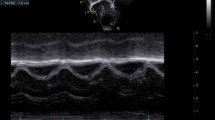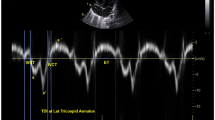Abstract
This prospective observational study conducted in a neonatal intensive care unit aimed to evaluate echocardiographic changes provoked by anemia and transfusion of packed red blood cells (pRBCs) in premature infants. In this study, 32 anemic premature infants had serial echocardiographic assessment of left ventricular (LV) systolic performance, LV preload, and afterload immediately before, within 48 h, and up to 120 h after the transfusion of pRBCs. Pretransfusional evaluations also were compared with similar assessments of 71 nonanemic inpatient premature infants analogous for sex, gestational age at birth, and postnatal age. Left ventricular systolic performance was estimated from fractional shortening, LV output, and LV myocardial performance index (LVMPI). The LV preload was estimated from the LV end-diastolic dimension and the ratio of left atrium-to-aortic root dimension (LA/Ao ratio). The LV afterload was estimated from end-systolic wall stress. The LVMPI was found to decrease with increasing corrected gestational age in both the nonanemic (R = 0.173; p = 0.03) and anemic (R = 0.460; p = 0.007) infants. The LVMPI was the only index that changed after transfusion of pRBCs, decreasing in the younger anemic infants (p = 0.011) and increasing in the older anemic infants (p = 0.012). Finally, a significant inverse relationship between pre- and posttransfusional LVMPI values (R = 0.730; p < 0.001) was noted. The LVMPI may allow for identification of preterm infants more likely to be helped by transfusion of pRBCs.



Similar content being viewed by others
References
Holland BM, Jones JG, Wardrop CA (1987) Lessons from the anemia of prematurity. Hematol Oncol Clin North Am 1:355–366
Alverson DC, Isken VH, Cohen RS (1988) Effect of booster blood transfusions on oxygen utilization in infants with bronchopulmonary dysplasia. J Pediatr 113:722–726
Cerussi A, Van Woerkom R, Waffarn F, Tromberg B (2005) Noninvasive monitoring of red blood cell transfusion in very-low-birthweight infants using diffuse optical spectroscopy. J Biomed Opt 10:051401
Frey B, Losa M (2001) The value of capillary whole blood lactate for blood transfusion requirements in anemia of prematurity. Intensive Care Med 27:222–227
Möller JC, Schwarz U, Schaible TF, Artlich A, Tegtmeyer FK, Gortner L (1996) Do cardiac output and serum lactate levels indicate blood transfusion requirements in anemia of prematurity. Intensive Care Med 22:472–476
Strauss RG, Mock DM, Johnson K, Mock NI, Cress G, Knosp L, Lobas L, Schmidt RL (2003) Circulating RBC volume, measured with biotinylated RBCs, is superior to the Hct to document the hematologic effects of delayed versus immediate umbilical cord clamping in preterm neonates. Transfusion 43:1168–1172
Wardle SP, Garr R, Yoxall CW, Weindling AM (2002) A pilot randomised controlled trial of peripheral fractional oxygen extraction to guide blood transfusions in preterm infants. Arch Dis Child Fetal Neonatal Ed 86:F22–F27
Caille V, Squara P (2006) Oxygen uptake-to-delivery relationship: a way to assess adequate flow. Critical Care 10(Suppl 3):S4
Lachance C, Chessex P, Fouron JC, Widness JA, Bard H (1994) Myocardial, erythropoietic, and metabolic adaptations to anemia of prematurity. J Pediatr 125:278–282
Tei C (1995) New noninvasive index for combined systolic and diastolic ventricular function. J Cardiol 26:135–136
Tsutsumi T, Ishii M, Eto G, Hota M, Kato H (1999) Serial evaluation for myocardial performance in fetuses and neonates using a new Doppler index. Pediatr Int 41:722–727
Ishii M, Eto G, Tei C, Tsutsumi T, Hashino K, Sugahara Y, Himeno W, Muta H, Furui J, Akagi T, Fukiyama R, Toyoda O, Kato H (2000) Quantitation of the global right ventricular function in children with normal heart and congenital heart disease: a right ventricular myocardial performance index. Pediatr Cardiol 21:416–421
Eto G, Ishii M, Tei C, Tsutsumi T, Akagi T, Kato H (1999) Assessment of global left ventricular function in normal children and in children with dilated cardiomyopathy. J Am Soc Echocardiogr 12:1058–1064
Kluckow M (2011) Functional echocardiography in assessment of the cardiovascular system in asphyxiated neonates. J Pediatr 158:e13–e18
Murase M, Ishida A, Morisawa T (2009) left and right ventricular myocardial performance index (Tei Index) in very-low-birthweight infants. Pediatr Cardiol 30:928–935
Rowland DG, Gutgesell HP (1995) Noninvasive assessment of myocardial contractility, preload, and afterload in healthy newborn infants. Am J Cardiol 75:818–821
Silverman NH, Schiller NB (1984) Cross sectional echocardiographic assessment of cardiac chamber size and ejection fraction in children. Ultrasound Med Biol 10:757–769
Bifano EM, Curran T (1995) Minimizing donor blood exposure in the neonatal intensive care unit: current trends and future prospects. Clin Perinatol 22:657–669
Bell EF, Strauss RG, Widness JA, Mahoney LT, Mock DM, Seward VJ, Cress GA, Johnson KJ, Kromer IJ, Zimmerman MB (2005) Randomized trial of liberal versus restrictive guidelines for red blood cell transfusion in preterm infants. Pediatrics 115:1685–1691
Kirpalani H, Whyte RK, Andersen C, Asztalos EV, Heddle N, Blajchman MA, Peliowski A, Rios A, LaCorte M, Connelly R, Barrington K, Roberts RS (2006) The premature infants in need of transfusion (PINT) study: a randomized controlled trial of a restrictive (low) versus liberal (high) transfusion threshold for extremely low-birthweight infants. J Pediatr 149:301–307
Mimica AF, dos Santos AM, da Cunha DH, Guinsburg R, Bordin JO, Chiba A, Barros MM, Kopelman BI (2008) A very strict guideline reduces the number of erythrocyte transfusions in preterm infants. Vox Sang 95:106–111
Alverson DC (1995) The physiologic impact of anemia in the neonate. Clin Perinatol 22:609–625
Izraeli S, Ben-Sira L, Harell D, Naor N, Ballin A, Davidson S (1993) Lactic acid as a predictor for erythrocyte transfusion in healthy preterm infants with anemia of prematurity. J Pediatr 122:629–631
Bifano EM, Smith F, Borer J (1992) Relationship between determinants of oxygen delivery and respiratory abnormalities in preterm infants with anemia. J Pediatr 120:292–296
Bard H, Fouron JC, Chessex P, Widness JA (1998) Myocardial, erythropoietic, and metabolic adaptations to anemia of prematurity in infants with bronchopulmonary dysplasia. J Pediatr 132:630–634
Evans N (2000) Echocardiography on neonatal intensive care units in Australia and New Zealand. J Paediatr Child Health 36:169–171
Kluckow M, Seri I, Evans N (2008) Echocardiography and the neonatologist. Pediatr Cardiol 29:1043–1047
Skinner JR (1998) Echocardiography on the neonatal unit: a job for the neonatologist or the cardiologist? Arch Dis Child 78:401–402
Poulsen SH, Nielsen JC, Henning RA (2000) The influence of heart rate on the Doppler-derived myocardial performance index. J Am Soc Echocardiogr 13:379–384
Tei C, Nishimura RA, Seward JB, Tajik AJ (1997) Noninvasive Doppler-derived myocardial performance index: correlation with simultaneous measurements of cardiac catheterization measurements. J Am Soc Echocardiogr 10:169–178
Author information
Authors and Affiliations
Corresponding author
Rights and permissions
About this article
Cite this article
Radicioni, M., Troiani, S. & Mezzetti, D. Functional Echocardiographic Assessment of Myocardial Performance in Anemic Premature Infants: A Pilot Study. Pediatr Cardiol 33, 554–561 (2012). https://doi.org/10.1007/s00246-012-0154-6
Received:
Accepted:
Published:
Issue Date:
DOI: https://doi.org/10.1007/s00246-012-0154-6




